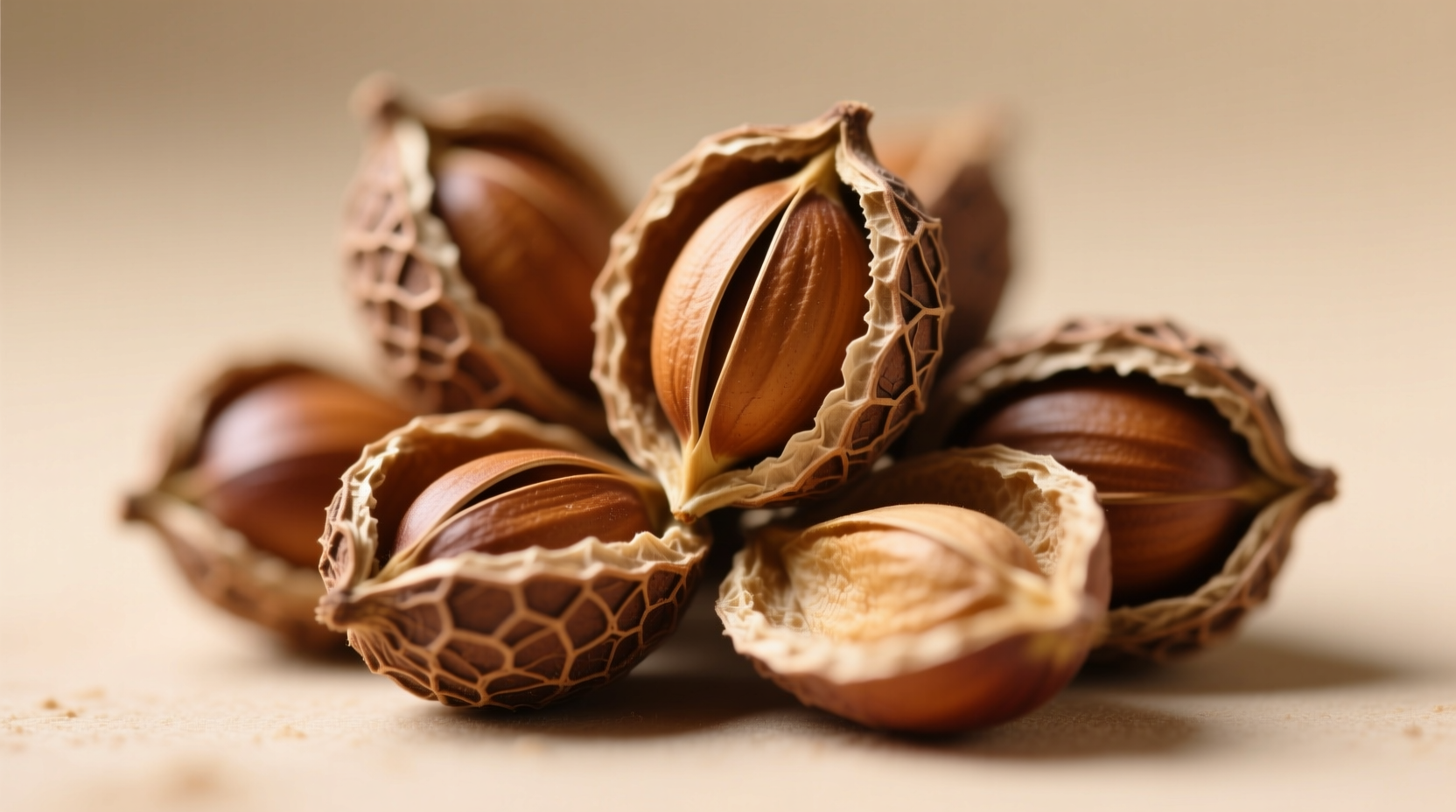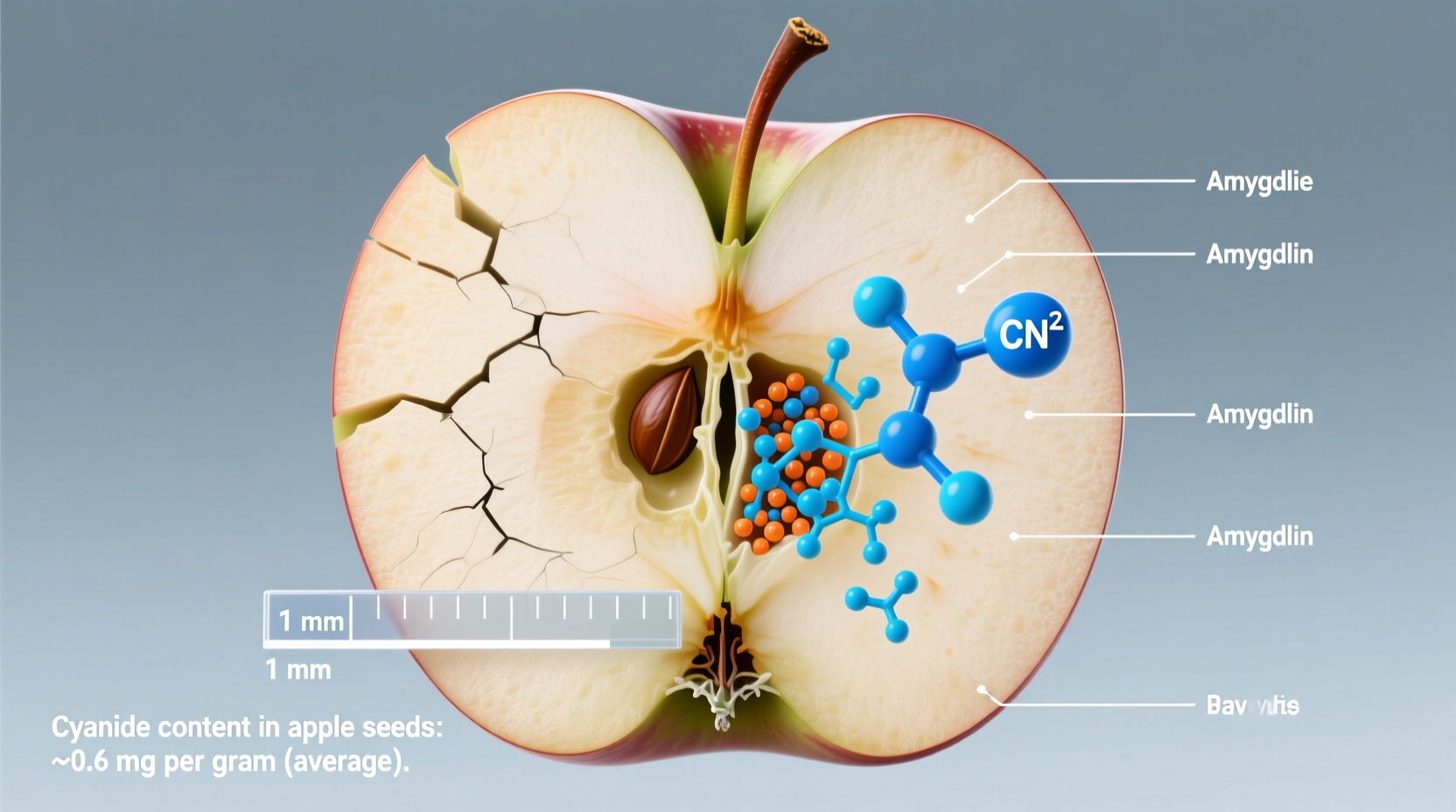Apple seeds contain amygdalin, a compound that can convert to cyanide when metabolized. Each seed holds approximately 0.4-1.2 mg of amygdalin, yielding about 0.2-0.6 mg of hydrogen cyanide when broken down. An adult would need to consume 150+ crushed seeds (or 500+ whole seeds) to reach a potentially lethal dose—accidentally swallowing a few seeds while eating an apple poses no health risk.
The Science Behind Apple Seed Cyanide: What You Actually Need to Know
When you bite into a crisp apple, you've probably wondered: Are those tiny seeds inside actually dangerous? Let's cut through the fear-mongering and examine the real science behind apple seed cyanide content. Understanding the actual risk helps you make informed decisions without unnecessary anxiety.
What Compound in Apple Seeds Contains Cyanide?
Apple seeds contain amygdalin, a natural compound classified as a cyanogenic glycoside. When apple seeds are crushed, chewed, or digested, amygdalin breaks down into hydrogen cyanide through enzymatic action. This defense mechanism evolved to deter animals from eating the seeds.
According to the U.S. Food and Drug Administration, amygdalin concentrations vary by apple variety but typically range from 0.4-1.2 mg per seed. The National Institute for Occupational Safety and Health (NIOSH) confirms that amygdalin converts to hydrogen cyanide at approximately 50% efficiency during metabolism.
| Fruit Seed Type | Amygdalin Content (per seed) | Hydrogen Cyanide Potential | Seeds Needed for Lethal Dose (Adult) |
|---|---|---|---|
| Apple | 0.4-1.2 mg | 0.2-0.6 mg | 150-500 crushed |
| Bitter Almond | 3-10 mg | 1.5-5 mg | 5-10 |
| Peach Pit | 2-8 mg | 1-4 mg | 10-40 |
| Apricot Pit | 1-4 mg | 0.5-2 mg | 20-80 |
Realistic Risk Assessment: How Many Seeds Are Actually Dangerous?
The Centers for Disease Control and Prevention identifies 1.52 mg/kg as the lethal dose of cyanide for humans. For a 70 kg (154 lb) adult, this translates to approximately 106 mg of hydrogen cyanide.
Here's what this means in practical terms:
- Whole seeds passing through your digestive system intact pose minimal risk—the hard seed coat prevents amygdalin release
- Crushed or chewed seeds release amygdalin, but you'd need to consume 150+ seeds at once to approach dangerous levels
- Children face higher risk due to lower body weight—a 22 lb toddler would need about 50 crushed seeds to reach concerning levels
Practical Guidance: Should You Worry About Apple Seeds?
Based on toxicology research from the National Center for Biotechnology Information, here's what you actually need to know:
Daily Apple Consumption
Eating one or two whole apples daily, including accidentally swallowing a few seeds, presents no health risk. The human body can detoxify small cyanide amounts through the rhodanese enzyme system.
Accidental Ingestion
If you swallow 5-10 seeds while eating an apple, no action is needed. The seeds will pass through your system without releasing significant cyanide.
When to Be Concerned
Seek medical attention only if:
- You intentionally consumed 100+ crushed apple seeds
- You experience symptoms like dizziness, headache, or rapid breathing within 30 minutes of consuming many crushed seeds
- A child ingested more than 20 crushed seeds
Debunking Common Misconceptions
Despite viral claims, apple seeds don't pose a meaningful threat in normal consumption scenarios. Let's address some persistent myths:
Myth: Apple seeds are highly toxic and should be avoided at all costs
Reality: The cyanide content requires massive quantities to be dangerous. You'd need to deliberately crush and consume hundreds of seeds to approach toxic levels.
Myth: Apple seed oil contains dangerous cyanide levels
Reality: Commercial apple seed oil undergoes processing that removes amygdalin. The European Food Safety Authority confirms properly processed apple seed oil contains negligible cyanide.
Myth: Apple seeds can cure cancer
Reality: Despite claims about "vitamin B17" (amygdalin), the National Cancer Institute states there's no evidence amygdalin treats cancer and it can cause cyanide poisoning.

Context Matters: When Apple Seeds Become Relevant
While normal apple consumption presents no risk, certain scenarios warrant attention:
- Homemade apple seed tea or extracts: Concentrating seeds increases risk significantly
- Foraging wild apples: Some varieties have higher amygdalin content
- Food processing: Industrial juicing that crushes seeds may require cyanide monitoring
The World Health Organization notes that food safety regulations for commercial apple products effectively manage any potential cyanide exposure from seeds.
What to Do If You're Concerned
Follow these practical steps:
- Don't panic if you swallow a few seeds—it happens to everyone
- Avoid deliberately crushing and eating seeds, especially for children
- Teach children to spit out seeds when eating apples
- Consult a medical professional only if you've consumed massive quantities
Final Thoughts on Apple Seed Safety
The cyanide content in apple seeds is a fascinating example of natural plant defenses, but it shouldn't influence your fruit consumption habits. Enjoy apples confidently knowing that normal consumption patterns present no meaningful risk. Focus on the substantial health benefits of eating whole fruits rather than worrying about minuscule theoretical risks from accidental seed ingestion.











 浙公网安备
33010002000092号
浙公网安备
33010002000092号 浙B2-20120091-4
浙B2-20120091-4